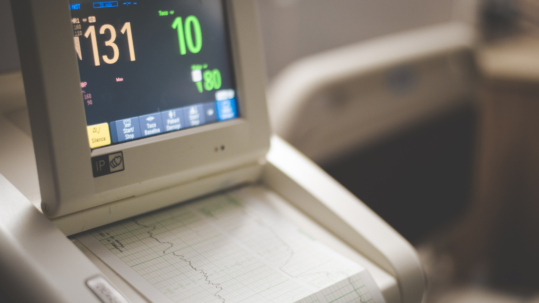
17 May What If I’m Faking It – Living With an Invisible Disability
If only I had a limp.
I’m kidding of course, but in the day-to-day of living postural orthostatic tachycardia syndrome (POTS), a part of me wishes there was some sort of external manifestation of the craziness happening inside my body. When I first started familiarizing myself with the POTS diagnosis, I saw that there was a lot of conversation surrounding it as an “invisible disability” and the desire to simply be believed. That the person’s symptoms weren’t a creation of their imaginations or a twisted desire to have unnecessary medical attention. It was surprising, and I figured “being believed” wouldn’t be a struggle for me. After all, I have people in my life who validate my struggle, help me advocate for care, and are walking with me on this journey. They see the impact it has on me, and would never assert that I’m making it up.
But what I didn’t expect, was that I would be my own biggest doubter.
There are times when I am struggling so much I wonder if I’ll ever drive again. I wonder if I’ll ever cook a meal again. I spend 24 hours straight laying in my bed with horrible dizziness every time I get up to use the restroom, and I wonder how I’m going to survive a lifetime of being disabled starting at the ripe age of 20. I watch my pulse get up to 180 by doing a flight of stairs or 140 just trying to get real pants on. I less-than-gracefully collapse after getting up from a chair. I feel sick after eating and jokingly tell my mom “So I think I’m going to give up eating. It’s not working for me”. I sit up and a headache grips my head, only to recede once I lay back down. I make a mental note to keep looking for a service dog candidate to give me back an inch of my independence, an ounce of comfort, and a bit of medical safety.
But the next day I’m almost ok. I get out of bed, and shake off the initial dizziness and pounding heart. I manage to eat actual food for breakfast. I sit at the table and do some writing. I drink an extra electrolyte drink, grab some salty snacks, and go on a quick errand. I get home tired, but proud of everything I’ve accomplished. I actually felt like a real human being – how exciting! But I quickly start thinking about yesterday, and the WILD difference in my ability to function.
“Maybe I was just being lazy yesterday?”
“I probably just didn’t drink enough water.”
“I think I couldn’t get up because I was just depressed.”
“I would feel like such a fake if I actually had a service dog.”
“Wow, it’s going to be embarrassing to admit it was all in my head. I feel normal now”
It happens every time, and it’s a heartbreaking and exhausting rollercoaster. Because I know that despite feeling ok now, the well-worn pattern dictates that I’ll likely get an alarm (or in other words, have a sudden onset of symptoms) at any moment. I know that pushing my limits randomly results in either surprising success or multiple days of regret. And regardless of which way it goes, there is grief.
The thing is, one day I NEED to be taken by the arm and guided through the aisle. I need to be dropped off right in front of the door (or use that disabled parking pass). That without certain accommodations, I would be incapable of being there at all.
And other days, I don’t. In fact, I might go for a short walk because it’s nice out or I might schedule multiple things in a row and still feel great by the end of the day.
But even when my heart is pounding out of my chest or if my vision is starting to get smeary, the comments are the exact same.
“Well, you look great!”
“You really hide it well”
Or the latest, “Do you actually believe your doctors when they say something is wrong? You’re only 20.”
I find these comments 100% valid. Nearly all my symptoms can be easily missed. A little pale to them, can be awful blood pressure shifts for me. A bit jittery to them, can be unchecked tachycardia for me. Being a bit unfocused might really be the inability to see properly. I may seem indecisive, but maybe I’m actually trying to calculate if I’m going to pass out right now and if I need to squat down. In my experience, most of my symptoms can be stuffed down until a more opportune time to lose my cool. But within all of it, invisibility does not equal nonexistent.
At a doctor’s appointment, I have been prescribed “breathing into a brown paper bag” as a solution for my symptoms of legitimate dysautonomia. I’ve been told not to come back because nothing more can or should be done. After months of waiting and several approved requests, one lady on the phone gently offered “I’m so sorry, but I don’t think your doctor is even sending the referrals.”
One would think that advocacy at the doctor’s office would be tough, but honestly, I find it far tougher to sit in the sun on a beautiful spring day, finally forgetting I’m sick, only to be gut-punched with self-doubt, confusion, and grief when I wonder if I’ve been faking it all along. To be sitting around the table, feeling and looking radiant, realizing that in this moment, I can’t honestly say that anything feels wrong.
I know I am not alone in feeling this way. Just last week I spoke with a fellow potsy (person living with POTS), and she told me she feels like a fake every time she has a good day. I immediately jumped in. I told her I was sorry she was dealing with a chronic illness, especially the kind that varies in intensity, timing, and type. I told her that she wasn’t alone and that there is a whole community of people just like her who know what it’s like to live with the symptoms. I encouraged her in the only way that made sense. But even writing the words “It’s ok to have good days” felt obvious and awkward – and yet as I wrote them I realized I didn’t even believe them myself. Is it? Is it really? Is it ok for recovery to *not* be linear? Is it ok for each day to look a bit different? Is it ok if I, myself, don’t know what to expect from each day?
And the answer is yes. It is.
Every day might look the same on the outside whether you’re going through a rough patch or are making headway towards recovery/remission. But whether you’re defending your need for accommodation or taking advantage of a good day, I want you to know that you are not alone in the tension of ability and inability and that it’s ok to do what you can one day at a time. You don’t need to prove you’re still sick to someone who may doubt your diagnosis, nor do you have to feel guilty for accomplishing bigger things than usual. Feeling better and being functional doesn’t mean you’re faking your illness, nor does having a rough week mean you’re doomed to a permanent worsening of symptoms.
The goal is not to find a way to hang on to our conditions but rather to make space for feeling well. Instead of imposing limits on ourselves based on how our conditions typically express themselves, we can take each day, hour, and minute at a time, doing and feeling the best we can in any given circumstances knowing that we live in an ebb and flow.
If you’re reading this, and can relate, please comment. I’d love to hear what your experience has been with inconsistent symptoms or dealing with invisible disabilities and what you’ve learned along the way.
-
Making a Full Physical Recovery – A Day-by-Day Miracle
“You should exercise more.” A brutal statement. One I had tried to fulfill on my own, and time and time again, had failed. It was a frustrating piece of advice from my doctor, and felt so out of reach as I navigated my bouquet of chronic illnesses....
27 June, 2024 No comment -
Awesome Recovery News!! And Why I No Longer Plan To Write About My Symptoms
I am so excited to report that after graduating from the 3-week Pain/Symptom Rehabilitation Center at Mayo Clinic in Rochester and continuing the program at home, I am nearly 100% recovered!...
05 March, 2024 3 Comments -
What is the Valsalva Maneuver like?
The Valsalva maneuver is EASILY the most fascinating thing I’ve gotten to do in this entire medical adventure. On the surface, it’s a fairly quick and easy part of autonomic testing, but underneath, it’s one of the coolest and most complicated mechanisms of the human body that I’ve encountered. ...
17 January, 2024 3 Comments






Sumanh Mohammed
Posted at 07:21h, 17 SeptemberHello kaley, I hope you are doing well.
I have been struggling with my symptoms for over 10 years, and just got diagnosed of having POTS.
I can’t explain how your words helped and encouraged me!
Really thank you, and I really wish you have more good days ❤️.
From a Potsy fellow
Kaley
Posted at 21:54h, 27 SeptemberWow – I am so sorry you struggled for so long without answers. Hopefully now having a diagnosis can provide targeted ways to work towards recovery and continue to help you find others who get the struggle and can support you on your health journey. It genuinely means so much to me to receive your comment. Not too long ago I was the one freshly diagnosed and desperately seeking others who knew what it was like. I’m so grateful to be a small part in your health journey, and am so glad you found it encouraging.
Take care Sumanh, I’m rooting for you!
Kaley
Shelby E.
Posted at 12:55h, 18 JuneThanks for putting my thoughts into words. Sadly though, I haven’t found a doctor that believes it either because they cannot duplicate it. I started having symptoms straight after waking up in ICU post Covid-pnuemonia with a 30 day life support stent, but no one is listening because my blood pressure looks fine. My left ventricle was “slightly” enlarged, but nothing that should cause anything. My dizziness was diagnosed by a therapist as being inner ear damage from an antibiotic that improved with vestibular therapies, but now has plateaued and some days its like its not there at all and others my child running across the room in my peripheral vision sets off waves in my vision and fall down and almost totally black out.
My family says they trust that I am not imagining this or making it up, but sometimes you can also see them starting to doubt me because it doesn’t make sense. Why was I perfectly fine yesterday and even this morning, but the 10 feet walk from my desk chair in one room to reaching for a bowl in the kitchen led to a black out and heart rate of 55 for a minute an half before it came back up?
My disability doesn’t exist in medical books supposedly, but I am living it every day and even get upset with myself about it.
Kaley
Posted at 19:50h, 27 JuneI’m so sorry you’re dealing with such a constellation of mystery symptoms. Thank you for sharing your story, and I truly hope you are able to find answers and healing. In the meantime, I am so glad you were able to resonate with the article. You are not alone!